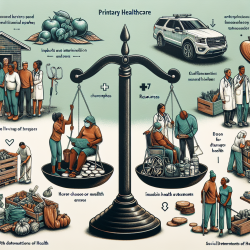Introduction
In the realm of healthcare, addressing the social determinants of health (SDOH) is crucial for achieving equitable health outcomes. A recent scoping review titled "Primary care-based interventions to address the financial needs of patients experiencing poverty" explores the role of primary care practitioners in identifying and addressing poverty as a health determinant. This blog post delves into the findings of this review, offering insights for practitioners seeking to enhance their skills and contribute to better health outcomes.
Understanding the Role of Primary Care
Primary care is often the first point of contact for patients within the healthcare system. It plays a pivotal role in providing continuous, comprehensive, and coordinated care. The World Health Organization defines primary care as a "whole-of-society approach to health and well-being," which naturally includes addressing broader determinants of health such as poverty.
Key Findings from the Scoping Review
The review synthesized data from 214 papers, categorizing them into two main types: screening tools and economic needs-specific interventions. These interventions operate at various levels, from passive data collection to direct intervention, aiming to address patients' financial needs.
- Screening Tools: These tools range from simple questions to complex questionnaires designed to identify patients' unmet financial needs. The review highlights the importance of understanding patients in both social and medical dimensions.
- Economic Needs-Specific Interventions: These include medical-legal partnerships, income and employment support, and food and housing security initiatives. Such interventions often involve collaborations with external services to provide comprehensive support.
Challenges and Opportunities
Implementing these interventions in primary care settings comes with challenges, such as resource constraints and the complexity of social welfare systems. However, the review emphasizes that despite these challenges, patients often appreciate efforts to address their social needs, even when the scope of action is limited.
Recommendations for Practitioners
Practitioners are encouraged to:
- Utilize existing screening tools to identify patients' financial needs effectively.
- Collaborate with community resources and services to provide comprehensive support.
- Engage in continuous education and training to enhance their understanding of SDOH and their impact on health.
Conclusion
The scoping review underscores the significant role primary care can play in addressing poverty-related health determinants. By implementing targeted interventions and collaborating with community resources, practitioners can contribute to improved health outcomes for patients experiencing poverty.
To read the original research paper, please follow this link: Primary care-based interventions to address the financial needs of patients experiencing poverty: a scoping review of the literature.










